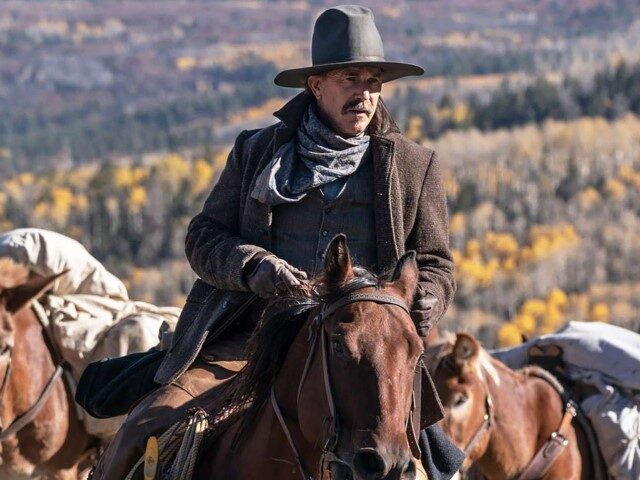Kevin Costner’s Horizon: An American Saga—Chapter 1 is stunningly ambitious for all kinds of reasons. To begin with, Costner is the movie’s director, producer, star, and co-writer. Then there’s the fact that this chapter is three hours long. What’s more, while reports on the specific amount vary, we know Costner poured tens of millions of his own dollars into what will hopefully be an unprecedented, four-chapter, 12-hour cinematic saga.
While there’s plenty of ambition in all of the above, I see Costner’s true ambition (and moral courage) elsewhere.
Costner is looking to not only tell the complicated truth about the settlement of the West, he is determined to do so in a way that sweeps you up in its story and characters—in a way that moves and entertains.
Horizon—Chapter 1 opens a few years before the start of the Civil War with an exciting and gut-wrenchingly tense massacre. Driven by a flier that promises a new start and plenty of land, dozens of mostly white settlers, including women and children, celebrate what looks like the successful launch of a thriving town. Then the Apache attack, and as history proves, the Apache were frequently merciless. Those women and children are not spared.
As human beings who aspire to second chances and new beginnings, we of course relate to these doomed settlers. These are not bad people. These are not imperialists. They have no desire to hurt anyone, including the American Indian. In fact, they are almost all decent, everyday folk looking for a better life. Who can fault them for that? But that brutal massacre changes things. Once united, the terrorized settlers splinter; and because violence begets violence, one bloodthirsty splinter now feels justified in delivering the worst kind of mercenary revenge against the Apache—or any Indian they might come across.
Then we meet the Apache, a people understandably worried about what could (and did) happen—the inevitable and indefensible destruction of their way of life. Obviously, they must defend their culture. Obviously, they have every right to do so. And once again, thanks to Costner’s storytelling skills and respect for his audience, we can relate, because in the Obama/Biden era, we all know what it’s like to see our way of life threatened.
Like the settlers, the Apache are now torn between those who believe continuing massacres will deliver the excuse the white man needs to destroy them and those eager to deliver the worst kind of terror upon the invaders.
Who’s right? The settlers or the Apache?
Who’s wrong?
Do the Apache really need land the size of Texas to accommodate a population of 25,000? Is that fair? Is that just? But the Apache were here first, weren’t they? Then again, didn’t the Apache steal much of their land from others? Does that make it right to take it from them?
Costner only asks these questions. Figuring them out he leaves up to us. And as unanswerable as those questions are, unlike the pedantic filmmaking all around us today that tells us what to think, searching for the answers is one of Horizon—Chapter 1’s many, many pleasures.
Through a thrilling, emotionally moving, beautifully filmed and intelligent first hour, Costner sets the hook of his theme deep, and if you’re a mature adult looking to be challenged into thinking things through for yourself and not a trained seal waiting for Jon Stewart to toss you fish, you exit that hour knowing you are in the hands of a master.
And then Kevin Costner shows up.
Horizon—Chapter 1 is not an ego trip. It’s a labor of love where the star doesn’t arrive for a full hour, and then nothing expected happens. In scenes that take their time building character and story, Costner’s Hayes Ellison finds himself reluctantly embroiled in a bitter family dispute involving a little boy and an oversexed prostitute (Abby Lee). There are no quick draws and no one shoots a gun out of anyone’s hand. The violence is true and then followed by a refreshing instinct to run.
That’s hour two.
Hour three involves a wagon train led by an unsure trail boss (Luke Wilson) who doesn’t really want to be trail boss. Watchful Indians and the human condition create uncertainty and tension without and within.
And then Horizon—Chapter 1 completes its circle with an obscene massacre of another kind.
Going in, I knew the movie was three hours long. Assuming we were only two hours in, I was surprised when it ended by way of a montage of coming attractions for Chapter 2, which hits screens August 16.
Is Horizon—An American Saga perfect, a masterpiece? I don’t know. It’s not done. What I do know is that Chapter 1 is a classic piece of filmmaking filled with some gorgeous photography (you’ll wish it was filmed in 2.35:1 widescreen), a soaring score, and great-looking stars playing normal, complicated, relatable, and imperfect characters in a story filled with romance, humor, passion, action, violence, sensuality, bravery, sentiment, truth, and conflict—all of it brought to us by an artist driven by a burning need to put his vision across, whatever the personal cost.
All of that is right up there on the screen, and I can’t wait for Chapter 2.
p;John Nolte’s first and last novel, Borrowed Time, is winning five-star raves from everyday readers. You can read an excerpt here and an in-depth review here. Also available in hardcover and on Kindle and Audiobook.

COMMENTS
Please let us know if you're having issues with commenting.